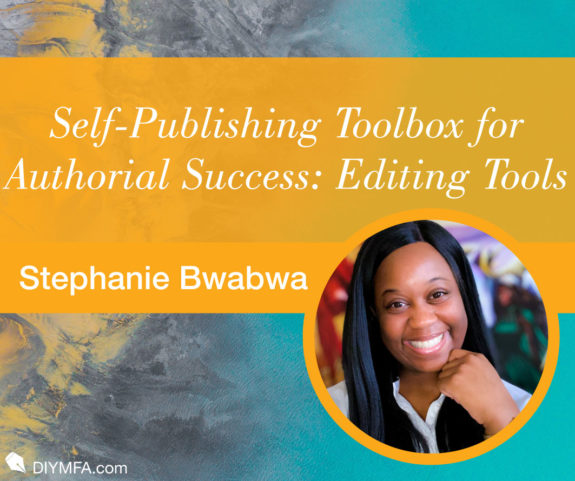You’ll recognize this article will be a continuation of the journey we began a little while ago. In the world of self-publishing, every budding author, and successful one, has to have a dependable toolbox. One filled with the resources they need to get their books done and skyrocket their careers.
In the last article, Your Self-Publishing Toolbox for Authorial Success: Writing Tools, we discussed the tools I highly recommend for the writing phase of an author’s publishing journey. In this article, we’ll dig into the editing tools I recommend for your self-publishing toolbox for authorial success.
When we finish writing the magical words, The End, a deep sigh of joy escapes our lips.
We did it. We. Wrote. The dang. Book. And it can seem as if we’ve reached the final finish line. Except there’s only one problem. Once the manuscript is done being drafted, the process of true writing has just begun. This is where your editing tools come in.
Editing Tools
Intuitive Editing by Tiffany Yates Martin
Intuitive Editing is a book written to explain exactly how to edit a book. It’s described as:
Developmental editor Tiffany Yates Martin has spent her career in the publishing industry honing practical, actionable techniques to help authors evaluate how well their story is working, where it might not be, and how to fix it.
With a clear, accessible, user-friendly approach, she leads writers through every step of deepening and elevating their own work, as well as how to approach the edit and develop their “editor brain,” and how to solicit and process feedback. Intuitive Editing doesn’t offer one-size-fits-all advice or rigid writing “rules”; instead it helps authors discover what works for their story and their style—to find the best version of their vision.
Whether you’re writing fiction, narrative nonfiction, or memoir; whether this your first story or your fiftieth, Intuitive Editing will give you the tools you need to edit and revise your own writing with inspiration, motivation, and confidence.
I myself go through this invaluable resource over and again every time I’m editing a new book. It’s that rich. Whether you’re tackling developmental edits, plot holes, character flaws, and so on, this book breaks down exactly how to fix your book. I can’t recommend it enough.
Google Docs
Here’s a second plug for Google Docs because the tool is versatile. You’ll remember that Google Docs is:
A free web-based application in which documents and spreadsheets can be created, edited, and stored online. Users of Google Docs can import, create, edit, and update documents and spreadsheets in various fonts and file formats, combining text with formulas, lists, tables, and images.
Even if you don’t choose to draft in Docs, it is a powerful editing tool for you. Not everyone is comfortable with editing software like: Grammarly and ProWritingAid.
Sometimes, all you need is to add your manuscript to a different writing processor, change the font, and get to polishing to create your best work.
ProWritingAid
ProWritingAid is the only platform that offers world-class grammar and style checking combined with more in-depth reports to help you strengthen your writing. Our unique combination of suggestions, articles, videos, and quizzes makes writing fun and interactive.
While I haven’t personally used ProWritingAid for one of my novels yet, I know this is an invaluable editing tool. I’ve used it for smaller projects and was blown away by its features. Not to mention how much ease it brought to the entire process of editing.
ProWritingAid also employs technology, such as artificial intelligence, to amplify the tool so while you may miss something, the tool itself will not. It’s a great software to use for processing your manuscript before sending it off to betas and editors.
Grammarly
Grammarly is a cloud-based typing assistant that reviews spelling, grammar, punctuation, clarity, engagement, and delivery mistakes. It uses artificial intelligence to identify and search for an appropriate replacement for the error it locates.
Grammarly is a good editing tool if you have a shorter manuscript and you’re not looking to do a thorough edit, such as developmental editing. I’ve used it for different projects. I, personally, noticed the tool works best on simpler, and shorter, projects versus, let’s say, a long-form epic fantasy manuscript.
If you like browser add-ons and something that’s quick, but works, I encourage you to add Grammarly to your toolbox for initial editing, after proofreading, before you dive in to handle developmental edits and so on.
Print It Out
Not a digital writer? No problem. I know many authors who will draft their books in a writing tool like Scrivener, but then they will go to their local library, or even somewhere like FedEx (USA establishment for printing and shipping), and they will print out their entire manuscript.
This helps them because they can physically scratch out lines, write notes, and rearrange scenes, all in a bright red pen… Okay, that may be too triggering. For some, the pen is purple… Or orange. Ha!
Nevertheless, if you need to touch it? Flip it? Physically put your pen to it? Go ahead and print it all out. Grab a massive binder to add the sheets to, and be sure to stack up on pens and highlighters so you can dive into a thorough edit of your book.
As you continue on your journey, you will find other editing tools that will help support you where you are and be of great assistance to your craft. However, if you’re uncertain of where to begin, I highly recommend these tools for your toolbox once you’ve crossed over into the editing stage of your book.
Tell us in the comments: What editing tools do you use? Are there any not on this list?

Stephanie BwaBwa is a Fantasy Universe Builder, Author, and Entrepreneur. She’s the creator of Elledelle, the universe filled with angels, adventure, romance, and magic. She’s the author of the fantasy series: The Seraphim Resistance and The Transcendents, as well as the writing guide, Fantasy Fundamentals. Stephanie co-hosts a podcast for indie authors called: Indie Author Lifestyle with her fantasy partner-in-madness, Angela J. Ford, and is a self-publishing columnist for DIY MFA. You can usually catch her going for a walk through a park, or simply binging anything creatively juicy with too many snacks. Get in contact with Stephanie directly at: stephaniebwabwa.com.







